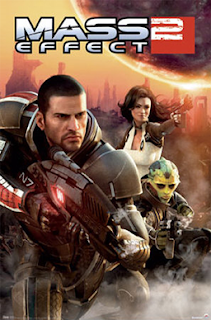Thursday, February 9, 2012
Pre-Owned Gaming
Depending on who you are, you either love or hate pre-owned game sales. Consumers typically love it, since it helps to manage the increasing prices of video game consoles and software. It makes it a feasible hobby for those who have bills to pay. On the other hand, publishers and developers hate it, as they seldom see a dime from the re-sale. It's a bit of a jumbled issue - people need to be able to afford the game, but developers need to turn a profit on it.
The whole debate has been further agitated with rumors that next-gen consoles, like the Xbox 720, will have built in features to deter used-gaming. The Official Xbox Magazine jokingly explains that this news may be the harbinger of "the End Times, when pipe-wielding mobs roam the streets and rivers run black with publisher blood." Jokes aside, this would hurt a lot of people and companies that rely on this method of distribution. However, this same article does a great job of proposing some alternative solutions to alleviate the problem. The two that I agree with most are lowering/varying the price points and implementing more quality, substantial downloadable content.
Currently, most used console games sell for $59.99 (minus tax) when they first come out. Some titles are worth this amount and offer a lot of bang-for-your-buck. The Elder Scrolls V: Skyrim boasts an average playtime of 75 hours - that's less than one dollar per hour of game time! Likewise, titles like Mass Effect and Dragon Age offer a similar level of long-term engagement. High profile multi-player series, such as Halo, Battlefield, and Call of Duty, offer gamers an ever-changing and competitive environment as well as a chance to earn new gear, titles, and trophies.
However, every game doesn't offer this type of rewarding experience. For example, Dead Space doesn't have the same value when you've played the single-player levels time and time again. The horror element comes from not being fully familiar with your surroundings, as well as not knowing what's around the next corner. Other horror games, Resident Evil included, fall into this same rut. Other examples include Medal of Honor (2010) and Crisis 2, which offered an entertaining single-player and mediocre multi-player. It's not a bad game, but there's other options out there which offer a much better return-on-investment. Finally, some games are just downright bad! To be polite, I won't name any names...Bomberman Act: Zero. Just as every movie isn't intended to be an Oscar winner, there are some games that aren't shooting for GOTY status. Developers and publishers ought to recognize this and adjust their pricing accordingly.
Having the price make sense is one way to boost your sales, but once people have the game - give them a reason to keep it! That's where downloadable content comes in. My favorite example of a game that poured 110% into DLC is Mass Effect 2. The Cerberus Network did a phenomenal job, in my opinion, providing gamers with a wealth of free and paid DLC: new and unique weapons, new and unique squad members, and new and unique mission packs. I'm being very intentional with the words "new" and "unique" here. I still think Lair of the Shadow Broker was the best DLC content I've ever played because it added an engaging story, as well as missions and content that extends far beyond the immediate mission. Kasumi's DLC pack was fun because she's the only stealth-melee focused squad member. Arrival, while not at the same level as Lair of the Shadow Broker, was still a great piece of content because it added a thrilling and engaging atmosphere. More games need to aspire to this level of quality content. Many people have held onto their copy of this game instead of trading it in, just because the next batch of content is so highly anticipated.
It's still too early to discern what is fact and fiction about the next-gen consoles - the pre-owned ban may just pass to the wayside. Either way, it is evident that publishers and developers need to rise up to the challenge and find new ways to make their products, either used or new, worthwhile for their consumers.
Subscribe to:
Post Comments (Atom)



No comments:
Post a Comment